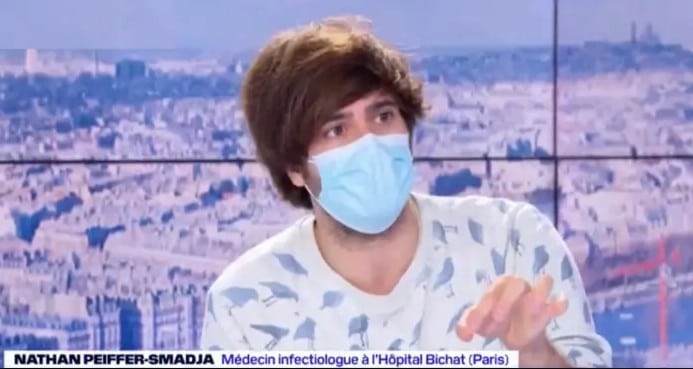When not in his COVID-19 research lab or with patients in his infectious diseases department, Dr Nathan Peiffer-Smadja, is on Konbini, Huffington Post, or Twitter, and soon on Tik Tok, with one goal: to fight misinformation about the pandemic by sharing reliable information.
With his tousled brown hair, Japanese manga style, the 31-year-old is today Assistant Head of Clinic in the Infectious and Tropical Diseases Department at Bichat University Hospital in Paris and associate researcher in Inserm’s IAME laboratory.
Dr Peiffer-Smadja is also a member of the European steering committee of the DisCoVeRy clinical trial (Inserm), which brings together 21 research partners in 13 European countries to find an effective treatment for COVID-19.
DisVoVeRy is a member of the “Solidarity” initiative, an international clinical trial launched by the World Health Organization (WHO) and its partners.
“It is true and beautiful international cooperation,” says Dr Peiffer-Smadja, who underlines the respect he has for WHO, after spending six months working in Guinea in 2015 in the midst of an Ebola epidemic. He was able to witness first-hand the efficiency and responsiveness of teams working on WHO’s vaccination project.
Fighting against Fake News
Recently, he responded to the UN’s call for researchers and specialists from around the world to share information on treatment and vaccine research and to counter the other pandemic, of misinformation and “fake news”, which is spreading as fast as COVID-19.
Entitled “Team Halo”, the campaign brings together some 20 scientists from around the world who share their knowledge and experience through social networks.
“Giving reliable medical information to the general public is part of my mission,” explains Dr Peiffer-Smadja. “There is a lot of misinformation about both vaccines and treatments; it is a cacophony,” he adds, regretting the “eroded trust” in medical specialists.
He also agrees with the expression “always trust evidence-based information over eminence-based”. “On social networks, for example, I am constantly attacked over my age or the people I work with, but never about the facts I expose or the articles I publish,” he says.
Restoring trust
“Medicine has become very political”. Systemic misinformation is not the result of chance, he believes, as the pandemic is also “an issue of distribution of power in the world”.
On social networks and in interviews to various media, he tries to go back to basics, on the modes of transmission of the virus, effective barrier gestures, or the latest established knowledge on the virus. “Today we see the importance of training doctors, professors and scientists in how to communicate and share key information with the public,” he insists.
A safe vaccine for everyone
The discovery and availability of a vaccine is the only solution to stop the pandemic, Dr Peiffer-Smadja says. He believes we should already start communicating about vaccines. “People need to be reassured. There are no shortcuts; this vaccine will be approved according to the highest standards. The process will not be rushed, regardless of the urgency or political pressure”.
Pfizer’s announcement on November 10 of conclusive results on a vaccine that is 90% effective has left Dr Peiffer-Smadja feeling optimistic. Even if the COVID-19 virus does not disappear, fewer people will be affected and “it will be much easier to manage the disease and succeed in what we are currently failing to do: go back up the chains of infection and identify contact cases. Provided, of course, that as many people as possible are vaccinated”.
According to United Nations Secretary-General, António Guterres, the future vaccine, or vaccines, against COVID-19 must be a “vaccine for the people”, a “public good” available to all.
Additional links:


